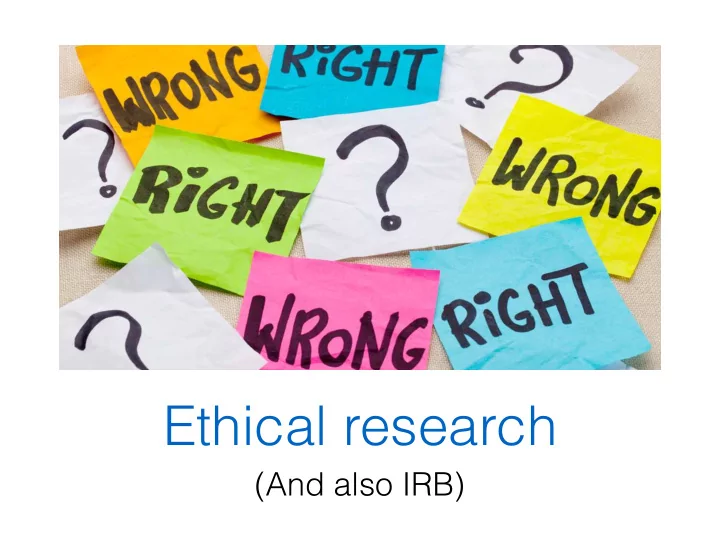

Ethical research (And also IRB)
What does it mean for research to be ethical?
The Belmont Principles • In the wake of the Tuskegee Syphilis Study (1974) • Fundamental principles for human subjects research • Respect for persons • Beneficence • Justice
Respect for persons • Autonomy: Making an informed choice • Protecting those who cannot do so • Application: Informed consent • Information, comprehension, voluntariness • Deception/debriefing
Beneficence • Do no harm? • Maximize benefit / minimize harm? • Application: Assessment of risks and benefits • Probability vs. magnitude • Alternative approach to same benefit? • To individuals, their families, wider society
Justice • Who benefits? Who bears the burden? • Application: Selection of subjects • Beneficial research for some, risky research for others? • Select vulnerable pops. only when necessary • Structural injustices
Deception • Why/when is it needed? • How to minimize harm?
How do we enforce research ethics?
Institutional Review Board • Federally-funded research in the U.S. • Diverse, independent board to review all human subjects research • Also determines what requires review • Researchers file IRB application describing proposed research • Cannot proceed until IRB approval
IRB Process at UMD
IRB is a floor, not a ceiling! You are responsible for protecting your participants, ensuring that IRB has enough information to make an informed decision. You are the domain expert!
The process • Prepare all materials (see next slides) • All team members and faculty PI must sign • Send to Sharron McElroy to sign (dept. liaison) • Link everyone’s training credentials • Submit to IRB • Receive comments/edits • Make revisions and resubmit • Receive approval documents • Now you can start recruiting!
What to prepare? • Application Part 1: The basics • Who, where, how much. • Fill out on IRBNet. • Application Part 2: The details • How will you recruit? • What will the study procedures be? • Confidentiality, risks
What to prepare? • Consent form: Use provided template • Slight variation for online studies: waiver of written consent • Advertising materials (flyers, email text, etc.) • Protocol itself • Prescreener if you have one • The questions you will ask / text you will read • Minor wiggle room, sometimes
Other stuff • Provide plenty of time for Michelle to review • We are lucky to have an awesome, responsive IRB • Be polite! • Think carefully about what you want to do • What you actually do must match what you said • Or file a modification (adds time)
IRB is a floor, not a ceiling! You are responsible for protecting your participants, ensuring that IRB has enough information to make an informed decision. You are the domain expert!
Ethics in practice (case studies)
Some good questions • Who is affected by the study? • How is consent obtained? • What ethical concerns are there? • What are possible harms? • What was handled well? • What could have been better? • Is there a less invasive method that would work? • If not, is the gain worth the harm? • How are participants debriefed?
Encore • “The PC endorses neither the use of the experimental techniques this paper describes nor the experiments the authors conducted.”
Social Phishing • “We launched an actual (but harmless) phishing attack targeting college students aged 18–24 years old.” • “A debriefing message invited subjects and participants to visit the project Web site and blog.” • “The number of complaints made to the campus support center was also small (30 complaints, or 1.7% of the participants). Only 7 participants (0.4%) requested to be excluded from the study (which they were).”
Recommend
More recommend